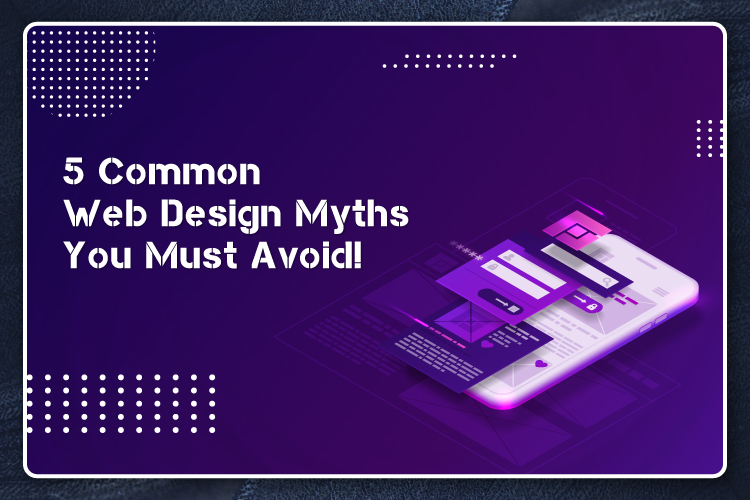5 Common Web Design Myths You Must Avoid!

We all know the importance of having a quality web design in this digital age. People around the world are spending more time than ever using their phones, laptops, etc. – around three hours daily, as per reports.
Your brand’s website is most probably the first place prospects will come across your business. Your website design not only communicates information about your products or services but also reflects your style, relevance, and values. While suggestions for how an ideal web design should be are omnipresent, various common misconceptions do rounds on the internet as well. In this blog, we will discuss five common web design myths (and what you should consider instead) that you need to strictly steer clear of as they could potentially harm your business and bottom line alike.
Myth 1: A Website Cannot Serve Multiple Audiences
While there might be generational or socioeconomic gaps in technological knowledge and aesthetic taste, it does not mean your web design cannot appeal to multiple audiences simultaneously. You need to work smarter, not harder, to engage with each of your target demographics by identifying those areas where their choices overlap.
Myth 2: Content Is Content
Keep in mind that not all types of content are created equal. The average visitor will quickly exit your site if they can’t find what they are looking for, meaning your page must communicate your key message in the quickest and simplest way possible. Try to be as open and bold as you can be when it comes to answering the 3 Ws:
- Who you are
- What you do
- Why a consumer should do business with you
In case your website is content-based, you need to present the information in as minimalistic a way as possible so that the visitors don’t feel overwhelmed. If you observe a high bounce rate on your website, it could be an indication that you aren’t keeping things simple enough. Try determining the least possible amount of text that can be used to convey your message, and think about adding photos and videos to save space and simplify things further.
Myth 3: You Have to Tell Your Entire Story on the Homepage Itself
The first-ever interaction of your prospect with your website should make them feel as if it was built for them only. This is especially vital if your site serves multiple demographics. Don’t overwhelm your site visitors with details about every single aspect of your products or services. Use clear CTAs instead to help the people navigate easily and quickly to the content they want to consume.
Remember, it’s more crucial to customize your content and build a clear path to key information than it is to display each facet of your brand on your website’s homepage.
Myth 4: Having a Well-Built Desktop Version Is Good Enough
The average customer carries out a vast majority of their online activities on smartphones and via mobile apps today. Generation Y and young adults, in particular, tend to use a smartphone to browse the internet. So, while it is vital to have a well-built desktop version of your website, having a mobile version is even more crucial, as per research.
Smartphones have become an integral part of people’s lives today. Therefore, it should not be much of a surprise that there is a good chance people will use their mobile devices to interact with your website. A speedy, clean, and easy-to-use mobile website, or even better a mobile application, will ensure a great user experience for your prospects.
Myth 5: You Do Not Require a Site Audit
A quality website and mobile app design call for a professional set of eyes. Website audit involves a thorough analysis of your web design and content that will help determine whether or not you are reaching your target audiences most effectively and efficiently. A complete audit will help reveal the weak spots and enhance your site and mobile application usability to make sure you reach as big an audience as possible effectively. This will help boost your conversions, meaning more leads.
Wrapping It Up
We are living in an internet-driven world today where web design is vital for your business’ success, and this is no top secret. These were the five most common website design myths that we encounter every now and then. However, you must steer clear of them as they could potentially hurt your brand and ultimately affect your bottom line negatively. Just keep these in mind while you sit down to get your web design done. We hope this helps!
